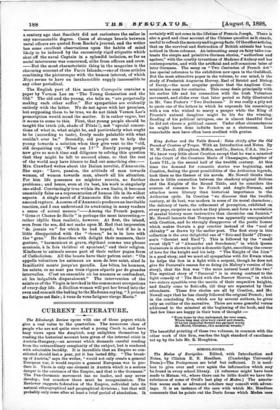King Arthur and the Table Round : Tales chiefly after
the OlI French of Crestien of Troyes. With an Introduction and Notes. By W. W. Newell. (Houghton, Mifflin, and Co., Boston, U.S.A. 16s.)— We know very little about Crestien except that he was a minstrel at the Court of the Countess Marie of Champagne, daughter of Louis VII., in the second half of the twelfth century. At this. time the demand for romantic stories was beginning, and Crestien, feeling the great possibilities of the Arthurian legends, took them as the themes of his novels. Mr. Newell thinks that there is little connection between the shadowy original Britons. and the Knights of the Round Table, and he considers the sources of romance to be French and Anglo-Norman, and attaches more literary than historical importance to the Arthurian cycle. In Crestien "we discover that the twelfth century, at its best, was modern in some of its moral characters the delicacy of taste, the refinement of perception, exhibited on every page, surprise as much as they please, and form a revelation of mental history more instructive than chronicles can furnish." Mr. Newell laments that Tennyson was apparently unacquainted with Crestien, and be strongly disapproves of the poetic license which makes Gawain a gay courtier instead of the "soul of chivalry" as drawn by the earlier poet. The first story in this collection is the ever delightful one of "Eric and Enide" (Tenny- son's " Geraint and Enid "). This is followed by the "small sweet idyll" of "Alexander and Soredamor," in which Queen Guinevere is shown in quite a domestic light, smoothing the course of love for the knight and his lady. "The Knight of the Lion is a good story, and we must all sympathise with Sir Ewain when he helps the lion in a fight with a serpent, though he does not give Sir Perceval's reason for so doing (in Malory's version of the story), that the lion was "the more natural beast of the two." The mystical story of " Perceval " is in strong contrast to the light comedy of The Maid with the Narrow Sleeves," in which two sisters squabble over the merits of their respective knights, and finally come to fisticuffs, till they are separated by their attendants. These five stories are all by Crestien, and Mr. Newell says that he has closely followed the original French ; but in the concluding five, which are by several authors, he gives only an outline of the narrative. There are some graceful verses addressed to the minstrel at the beginning of the book, and the last few lines are happy in their turn of thought
From home by thee undreamed, far over ocean, Where long may olive bury sword and sheath, 01 thrioe immortal flowers the garland woven Be offered, Christian, this memorial wreath."
The beautiful printing of these two volumes, in common with the other work of this firm, reaches the high standard of excellence set up by the late Mr. R. Houghton.


































 Previous page
Previous page